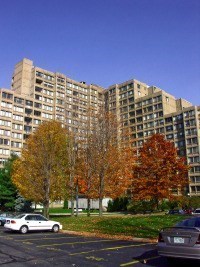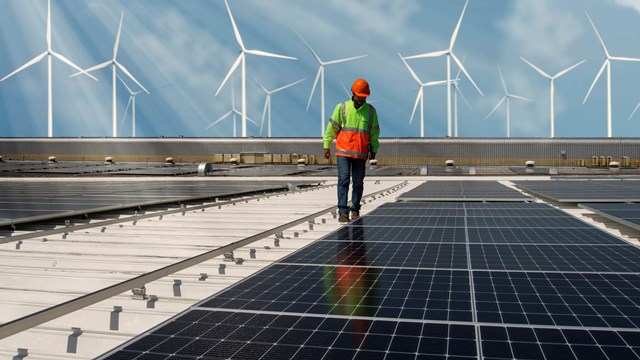
Many condominiums these days are looking to save energy and go "green," but are concerned that doing the environmentally right thing will cost them a lot of green, as in cash. Discouragingly, energy-saving items like super efficient replacement windows tend to be expensive to purchase and install and have long payback periods.
But a number of New England condominiums have discovered that there is still some low-hanging fruit in the energy conservation arena. For community associations that can utilize the technology, co-generation offers an extremely short payback time, followed by year after year of savings that run in the tens of thousands.
Co-generation involves siting a natural-gas-burning generator at a condominium, about the size of an office desk, and using its cheaply- produced electricity in place of energy purchased from a utility. What makes co-generation a double value is that it also captures the considerable heat created by the production of electricity and uses it to supply heat and hot water to the condominium — providing two types of energy from one source.
"Just like your car is dumping heat through its radiator, you're wasting some of that energy. What we're trying to do is utilize every single ounce of energy," says Peter L. Goldsmith, Marketing Coordinator of Aegis Energy Services Inc. in Holyoke, Massachusetts.
Savings from using a co-generator are substantial, typically reducing condominium utility bills by one-half to two-thirds, says Goldsmith.
$45,000 a Year in Savings
Seaport Condominium at Marina Bay in Quincy, Massachusetts, installed a single 75-Kilowatt co-generation unit about nine months ago and it is already generating about $45,000 a year in savings, says Goldsmith. Most condominiums can repay the cost of the co-generation unit in two to five years, he says.
Seaport Condominiums joins a growing number of communities and facilities in Massachusetts that have installed co-generation systems, including The Towers in Chestnut Hill in Newton; Wingate, an extended health care facility in Brighton; Country Club Heights in Woburn; Harbor Point Apartments in Dorchester; Deutches Altenheim Nursing Home in West Roxbury,; and Francis Cabot Lowell Mill in Waltham.
Condominiums that are good candidates for co-generation are those that are over 85 units, have a high on-site demand for heat and electricity, and already have natural gas service, says Goldsmith.
The energy demand could take the form of a year-round swimming pool, health club, kitchen, or, most importantly, the use of a central loop system by which water is pumped throughout the facility to provide both heat and domestic hot water.
Existing Boiler Life Greatly Extended
Co-generation units, producing 75 kilowatts per hour, are typically set up in the boiler room and supplement— but don't replace—the existing boiler, says Sanders. Because the co-generation unit works in conjunction with the boiler, it can greatly extend the life of the existing boiler," he says. "It will extend the life of the boiler by reducing demand. A lot of places that are thinking about replacing old boilers, can get many more years of service out of them. In reality [with co-generation], your boilers really aren't going to be turning on much at all," says Sanders.
Purchase of Co-generation Units not Needed
Condominiums that are interested in installing co-generation units but can't, or prefer not to, lay out large amounts of cash can take advantage of an "on-site utility program" offered by American DG Energy in Waltham, Massachusetts.
Under the plan, American DG Energy installs the co-generation units, owns them and performs 100 percent of the maintenance, according to company president Barry Sanders. The energy produced by the co-generation unit — both heat and electricity — is then sold to the condominium at a rate discounted from what they would pay from their incumbent utility, says Sanders.
"We take their avoided cost, their electric rate, and we give them a 10 percent discount off of it," says Sanders. "Whatever the price they would pay, we're always 10 percent less. If the price of electricity drops to eight cents or jumps to 15 cents, we don't care, we're always going to give them a 10 percent discount.
A Guaranteed Hedge
"What we become is a guaranteed hedge — in this case, 10 percent — over what they would pay their own utility," says Sanders, who adds, "And they [condos] only pay for the energy we produce; there are no operating or capital costs."
While co-generators have always been economically attractive, Sanders says their other attributes are also attracting notice. "When we first got into this business, everything was about dollars and savings," says Sanders. "The motivation was dollar savings from an operating perspective, and the second piece was about capital avoidance — you don't have to write a big check. You can put your dollars into other areas."
However, said Sanders, he has seen co-generation's green credentials arise with increasing frequency, especially during the last year. Noting that "our clients never asked the [environmental] question" in the past, Sanders notes that "now they're asking it on a regular basis."
Installing one 75-Kilowatt co-generation unit, says Sanders, is "the equivalent of adding 300 acres of forestland or removing 190 cars from the road. From a green footprint perspective, we're offsetting approximately 18,000 tons of carbon per year."
And that combination of energy savings with environmental benefits is a great fit for concerned condominiums, says Sanders. "With all the energy issues in our country, energy efficiency is something we can all win at," he says.






Leave a Comment